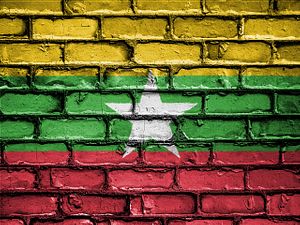Myanmar’s Supreme Court agreed Tuesday to rule on an appeal filed by lawyers for two Reuters journalists sentenced to seven years in prison for their reporting on Myanmar’s brutal crackdown on Rohingya Muslims.
Reporters Wa Lone and Kyaw Soe Oo remained in Insein Prison while their lawyers attended the court’s first hearing on their appeal in the capital, Naypyitaw. The prisoner’s wives also came to the court hearing, bringing their young children.
The reporters’ convictions for violating the country’s Official Secrets Act have been condemned by rights groups, Western governments, and global press associations. They also have highlighted freedom of expression problems in Myanmar, even after it transitioned from military rule to an elected government under Nobel Peace laureate Aung San Suu Kyi.
Supporters of Wa Lone and Kyaw Soe Oo contend the two were framed because of official displeasure over their reporting on the crackdown by security forces on members of the Rohingya minority in Rakhine state.
More than 700,000 Rohingya fled to neighboring Bangladesh following the crackdown, which began in August 2017. Critics have described the campaign as ethnic cleansing, or even genocide, on the part of Myanmar security forces.
The Supreme Court appeal contends that lower court rulings involved errors in judicial procedure. An appeal in January to a lower court was rejected on the grounds that the reporters’ lawyers failed to submit enough evidence to prove that Wa Lone, 32, and Kyaw Soe Oo, 28, were innocent.
Lawyer Khin Maung Zaw said Tuesday that in a 90-minute submission to the court, he cited 13 grounds on which he believed judicial procedure had been violated.
Tuesday’s decision by the court means the reporters’ lawyers will meet again with the judge, who could sustain the appeal if he determines that legal procedure had been violated. In that case, all the rulings from the lower court would be vacated, which could result in the reporters being freed, or having their sentences reduced, or facing new judicial action, according to Khin Maung Zaw.
If the appeal is dismissed, the actions of the lower courts would remain valid. It appears the law could still allow some further opportunities for review of the case, as well as the opportunity to ask for a pardon.
No date was set for the next appearance before the judge.
“Today, we hoped together for the best and believed that our family could be united as soon as possible,” said Chit Su Win, Kyaw Soe Oo’s wife.
Pan Ei Mon, Wa Lone’s wife, said she believed the judge would rule according to reason on the basis of the arguments put forward by the men’s lawyers.
“I don’t quite understand well about the judiciary,” she said. “But I simply want to be united with my husband and I want both of them to be home as soon as possible.”
By The Associated Press.

































